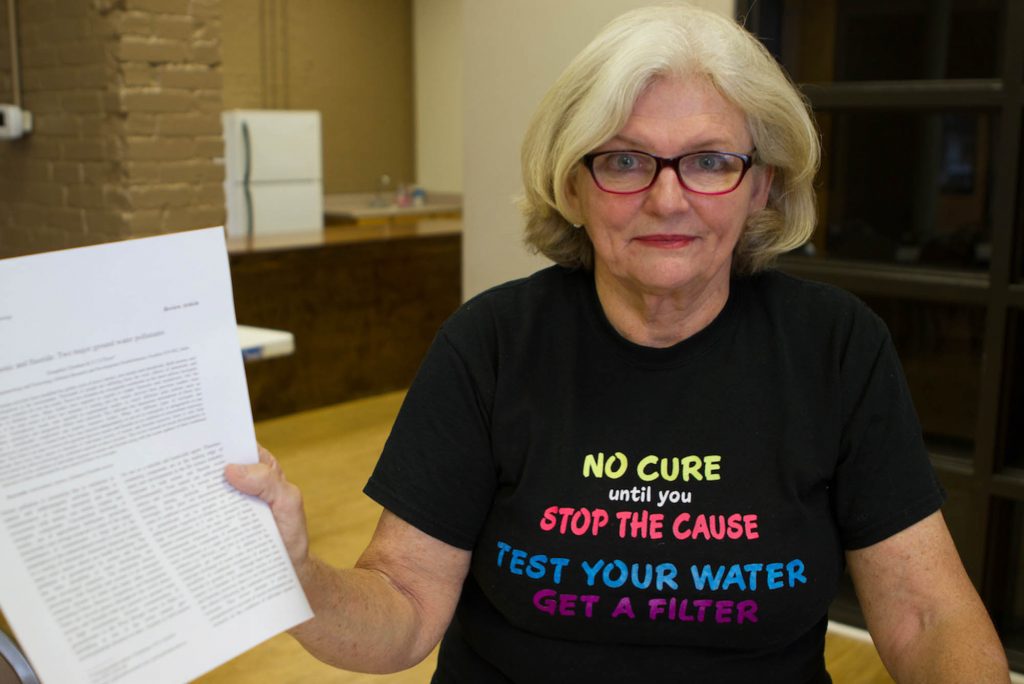Georgia ‘Water Lady’ campaigns against cancer-causing chemicals in water

Janet McMahan shows documentail that detail water pollution in southeast Georgia. (Photo by Brandon Kitchin/News21)
WAYCROSS, Ga. – Janet McMahan has a message for southeast Georgia, and it is the one printed on her T-shirt: “No cure until you stop the cause, test your water, get a filter.”
In 2014, McMahan became committed to improving water quality after she lost her 28-year-old son to a rare form of cancer she believes he got from drinking contaminated water.
“I started to get the health department to warn people to test their water, (but) they said they were not allowed to tell people to test the water,” said McMahan, who lives in Ocilla, Georgia.
She said she believes government neglect and lack of awareness contributed to health problems in her family. McMahan, her son Ben and her two Labrador retrievers were all diagnosed with cancer in 2009. After the four rare cancer diagnoses, McMahan felt confident she knew the cause: the water they were drinking.
She had read an article about Bangladesh, where millions of people were being exposed to arsenic in their drinking water from wells. McMahan and her family also depend on well water.
When she had her well water tested, it showed negligible levels of arsenic, she said. However, she said her water heater had toxic levels of the cancer-causing chemical in it. She said she later found unsafe levels of lead and radon as well.
Arsenic is a known human carcinogen associated with skin, lung and bladder cancer, according to the National Institute of Environmental Health Sciences. It also has been connected with kidney and liver cancer.
The U.S. government has limits on how much arsenic is allowed in drinking water. The maximum level of inorganic arsenic permitted is 10 parts per billion. While public water systems are frequently tested for it, there are no regulations that mandate testing of water from private wells.
“All they had to do was tell us there was arsenic in the water, and we would have bought a filter … and my son would still be here,” she said.
After she lost her son, she became active in the community and told people to get their water tested. Her efforts have been praised by well-known environmental advocate Erin Brockovich and have earned McMahan the nickname, “The Georgia Water Lady.”

Janet McMahan McMahan became committed to improving water quality after she lost her 28-year-old son to a rare form of cancer she believes he got from drinking contaminated water.
(Photo courtesy of Janet McMahan)
“I’m doing this for Ben because I could not keep him alive,” she said. “This way, I’m keeping him alive. I’m doing this in his memory. He deserved better.”
She recently helped residents of Mount Pleasant, South Carolina, where some people voiced concerns that pesticides in the water could be causing brain cancers.
For several years, she has worked closely with the environmental activist group Silent Disaster of Waycross, Georgia. Members believe local industries have polluted waterways, which have resulted in increased rates of childhood cancer and caused other diseases.
“These people need to know what they’ve been exposed to,” she said.
McMahan and her husband Howard McMahan, a family physician, have used their platform in the medical community to alert patients, other professionals and politicians that water contamination can cause cancer and other illness.
The couple has met with top National Institute of Environmental Health Sciences officials in Washington, D.C., and U.S. Rep. Austin Scott to express concerns on a national level.
McMahan’s ultimate goal is to raise awareness about water contamination to prevent any more unnecessary death.
“Ben didn’t have to die – that it was greed that put him 6 feet under. It was politicians that put him 6 feet under,” she said. “It was not knowing, doctors not knowing, people not knowing, that the water was causing cancer is what put him 6 feet under. And if he could do anything about it, he would have. He helped everybody. He was just loved by everybody, especially me.”
To see the full News21 report on “Troubled Water,” go to troubledwater.news21.com on Aug. 14.